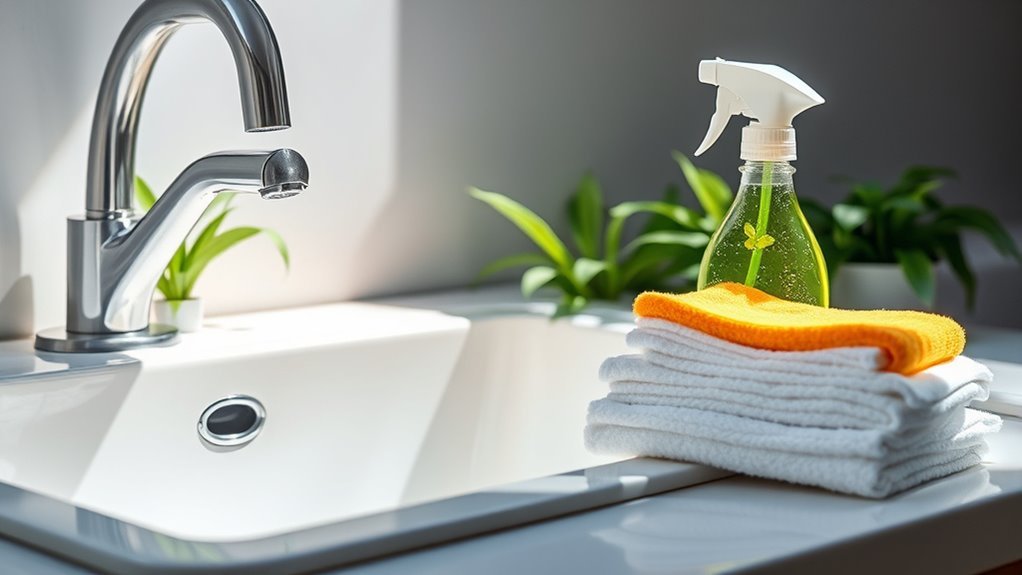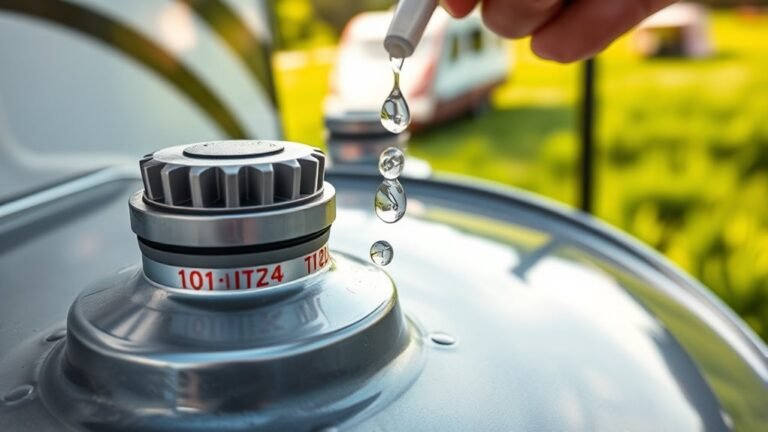Spring Cleaning Guide for Sink
To freshen your sink this spring, start by clearing out debris and gathering gentle, eco-friendly cleaners like vinegar and baking soda. Scrub stubborn stains with a baking soda paste and rinse thoroughly to prevent water spots. Tailor your approach to your sink’s material—whether stainless steel, porcelain, or granite—to avoid damage. Keep it sparkling daily by wiping down and using drain screens to catch grit. Keep going to discover more tips for a spotless, clog-free sink.
Preparing Your Sink for Deep Cleaning
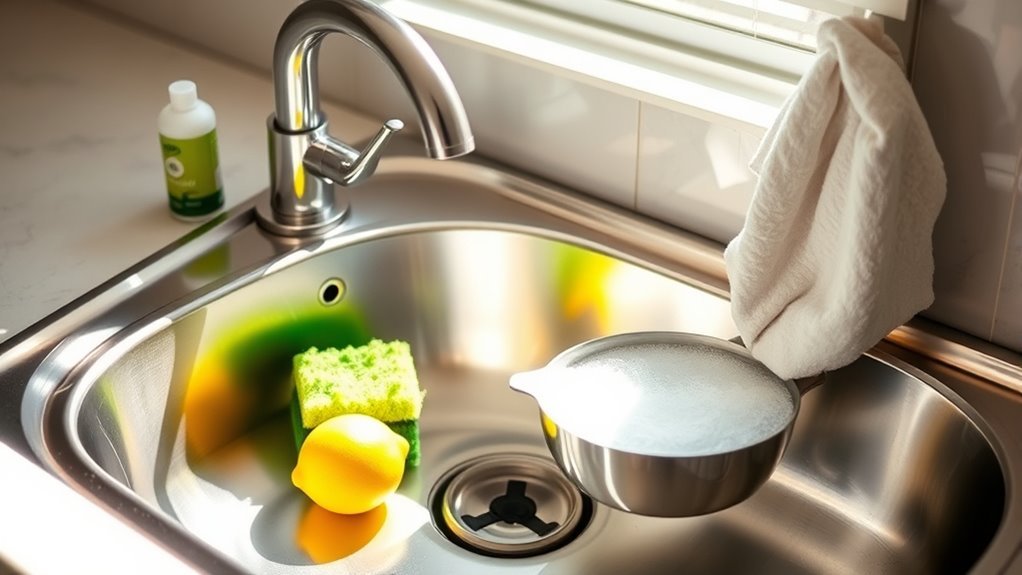
Before diving into a deep clean, you’ll want to clear your sink of any dishes, debris, or personal items. This sink preparation step is key to giving you the freedom to tackle every corner without distractions. Once the sink’s empty, grab your cleaning supplies — a sponge, scrub brush, and gloves are a great start. Make certain you have a bucket or bowl nearby for rinsing. Don’t forget to check your drain for any trapped food or gunk; removing it now prevents clogs during cleaning. By thoroughly prepping your sink, you set yourself up for a smooth, efficient deep clean that leaves your space fresh and ready to use. Taking these small steps guarantees your cleaning process is both freeing and effective.
Choosing the Right Cleaning Products
Although there are many cleaning products on the market, choosing the right one for your sink can make all the difference in achieving a spotless finish without damaging the surface. You want a product that’s effective yet gentle, giving you freedom from harsh chemicals. Eco friendly options are a smart choice—they protect your sink and the environment without compromising on product effectiveness. Look for natural ingredients like vinegar or baking soda, or biodegradable cleaners designed specifically for sinks. Avoid abrasive powders or bleach-based products if your sink has a delicate finish. By selecting the right cleaner, you’ll save time, protect your sink’s integrity, and enjoy a fresh, clean space that feels good to maintain. Your spring cleaning is about being smart and free in your choices.
Removing Stubborn Stains and Buildup
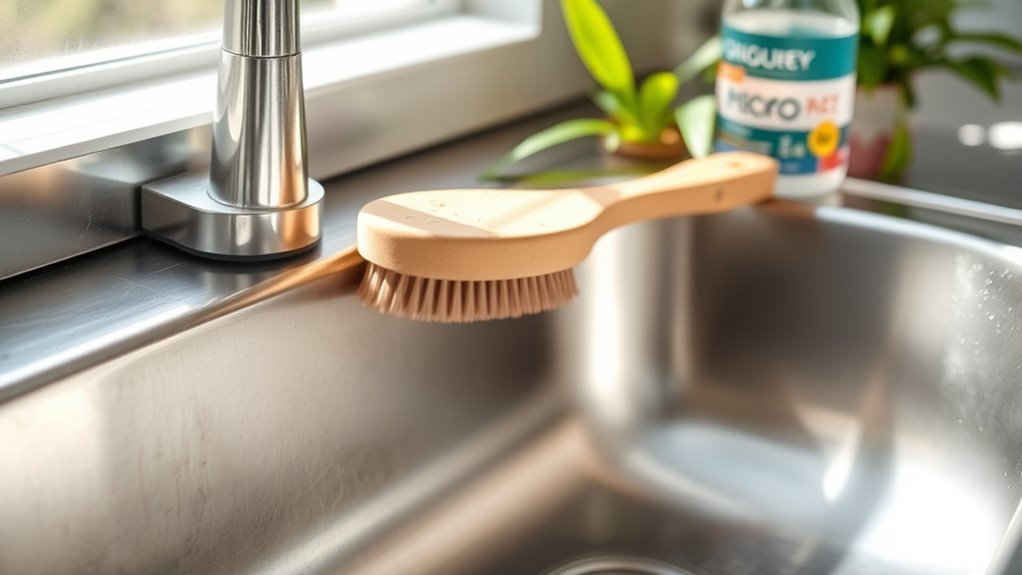
When stains and buildup refuse to budge, you’ll need targeted methods to restore your sink’s shine. Start with effective stain removal techniques like using a paste of baking soda and water to gently scrub away grime without harsh chemicals. For mineral deposits, a splash of vinegar works wonders, breaking down buildup naturally. After tackling tough spots, rinse thoroughly and dry to prevent water marks. To keep your sink looking fresh longer, adopt buildup prevention tips such as wiping it down daily and avoiding leaving standing water. By combining these smart stain removal techniques with simple upkeep habits, you’ll enjoy a spotless sink that feels as free and clean as you want your space to be.
Deep Cleaning Techniques for Different Sink Materials
When it comes to deep cleaning your sink, the approach varies based on the material. You’ll want to use gentle methods for porcelain, specific cleaners for stainless steel, and avoid harsh chemicals on granite composite. Let’s explore the best techniques to keep each type looking spotless.
Stainless Steel Care
Since stainless steel sinks are prone to water spots and fingerprints, you’ll want to use gentle but effective cleaning methods to maintain their shine. Start with a soft cloth and mild detergent to wipe away everyday grime without scratching the surface. For stainless steel maintenance, avoid harsh chemicals or steel wool that can damage the finish. Instead, use a paste of baking soda and water for tougher stains, scrubbing lightly with a non-abrasive sponge. Rinse thoroughly and dry immediately to prevent water spots. To boost your sink’s natural gleam, stainless steel polishing with a bit of olive oil or a specialized cleaner works wonders—just buff in the direction of the grain. With these simple steps, you’ll keep your sink looking fresh and free, giving you the freedom to enjoy a spotless kitchen centerpiece.
Porcelain Sink Tips
Stainless steel sinks need gentle care to keep their shine, but porcelain sinks call for a different approach due to their unique surface. When you’re tackling your porcelain sink, keep these tips in mind to maintain its beauty and avoid damage:
- Use a non-abrasive cleaner to prevent scratches and preserve the finish.
- For stubborn stains, try baking soda mixed with water as a gentle scrub.
- If chips or cracks appear, porcelain repair kits can restore your sink without hassle.
- Finish with sink polishing to bring back a smooth, glossy surface and protect against future wear.
Granite Composite Cleaning
Granite composite sinks require a careful balance of cleaning power and gentle care to keep their durable surface looking fresh. When tackling granite composite cleaning, you want to avoid harsh chemicals that can damage the finish or cause composite durability concerns. Instead, opt for a mild dish soap mixed with warm water for daily cleaning, and a soft cloth or sponge to prevent scratches. For deeper cleaning, use a baking soda paste to gently scrub away stains without compromising the sink’s strength. Remember these granite maintenance tips: always rinse thoroughly and dry after cleaning to avoid water spots and mineral buildup. By following this routine, you’ll maintain a resilient, beautiful sink that supports your freedom in the kitchen without constant worry.
Natural Alternatives for a Chemical-Free Clean
You can easily freshen up your sink without harsh chemicals by using simple natural ingredients. Try mixing vinegar and baking soda for a powerful scrub, or squeeze some lemon juice to brighten and deodorize. Adding a few drops of your favorite essential oil can boost the scent and provide extra cleaning power.
Vinegar and Baking Soda
Two common household ingredients, vinegar and baking soda, can tackle most sink cleaning tasks without harsh chemicals. You’ll love how these natural cleaners free you from toxic products while delivering impressive results. Vinegar benefits include breaking down mineral deposits and cutting through grease, while baking soda reactions create fizzing power that lifts grime and deodorizes. Here’s why you should turn to them:
- Effortlessly unclog drains by pouring baking soda followed by vinegar.
- Remove stubborn stains with a paste made from both.
- Neutralize odors lingering in your sink.
- Protect your pipes from harsh chemicals and corrosion.
Using these two together gives you a powerful, eco-friendly way to keep your sink spotless and fresh — all while embracing the freedom of natural cleaning.
Lemon Juice Freshener
Lemon juice offers a natural and effective way to freshen your sink without relying on chemicals. You can harness the lemon benefits by simply cutting a lemon in half and rubbing it directly on your sink’s surface. The natural acidity helps break down grime and neutralize odors, leaving behind a crisp citrus rejuvenation. If you want an extra boost, squeeze some lemon juice into the drain to combat any lingering smells. This method not only cleans but also revitalizes your sink with a fresh scent, giving you freedom from harsh chemical cleaners. Embracing lemon juice lets you maintain a sparkling clean sink while enjoying the simplicity and power of natural ingredients. It’s an easy, safe, and invigorating alternative for your spring cleaning ritual.
Essential Oil Boost
Essential oils offer a powerful and natural way to boost your sink cleaning routine without harsh chemicals. By embracing essential oil benefits, you can enjoy a fresh, aromatic cleaning experience that’s both effective and liberating. Here’s how to use them for a chemical-free clean:
- Add a few drops of tea tree oil to your cleaning spray for its antibacterial properties.
- Mix lemon essential oil with baking soda to brighten stains and leave a crisp scent.
- Use eucalyptus oil to cut through grease while invigorating your sink area.
- Blend lavender oil for a calming aroma that also helps reduce mold growth.
Incorporating these oils lets you take control of your cleaning, enhancing freshness naturally while avoiding synthetic chemicals. Enjoy a sink that’s sparkling and scented, the way you want it.
Maintaining a Sparkling Sink Daily
Although deep cleaning is important, maintaining a sparkling sink daily is even more effective for preventing buildup and stains. By adopting simple daily sink habits, you free yourself from tedious scrubbing sessions later. After each use, quickly rinse your sink with warm water to wash away soap residue and food particles. Wipe it down with a microfiber cloth to keep water spots at bay. For a quick cleaning tip, sprinkle baking soda on the sink surface, then scrub gently with a soft sponge before rinsing. This routine keeps your sink fresh and shiny without taking much time. By committing to these quick cleaning tips, you enjoy a spotless sink effortlessly, giving you the freedom to focus on what truly matters.
Preventing Future Grime and Clogs
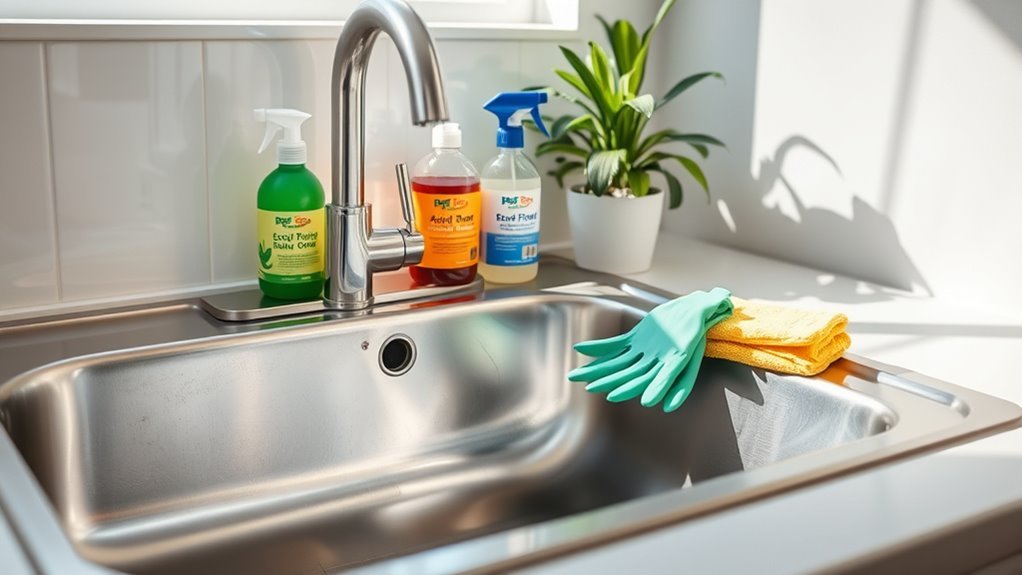
To keep your sink running smoothly, it’s crucial to tackle grime and clogs before they start. You want freedom from unexpected blockages and messy backups, so a proactive approach is key. Here’s how you can prevent future sink troubles:
Prevent sink issues early to avoid blockages and messy backups with a proactive maintenance approach.
- Use drain screens to catch food scraps and debris before they enter your pipes.
- Avoid pouring grease or oil down the drain, as they solidify and cause buildup.
- Perform regular inspections under the sink to spot leaks or slow drainage early.
- Flush drains with hot water weekly to keep them clear and fresh.
Frequently Asked Questions
Can I Use Bleach to Clean My Kitchen Sink?
Using bleach to clean your kitchen sink is like wielding a double-edged sword—it can sanitize effectively but may damage surfaces or harm your health. If you want to keep your freedom from harsh chemicals, consider bleach alternatives like vinegar or baking soda, which offer gentle yet powerful sink sanitation. These options let you maintain a clean, safe space without sacrificing peace of mind or your environment’s well-being.
How Often Should I Replace My Sink’S Drain Strainer?
You should replace your sink’s drain strainer every 6 to 12 months, depending on its material and how often you do drain maintenance. If it’s made of stainless steel, it tends to last longer, but plastic strainers might wear out quicker. Keep an eye out for cracks or buildup that can’t be cleaned. Staying on top of this gives you freedom from clogs and keeps your sink flowing smoothly.
Are Commercial Sink Cleaners Safe for Septic Systems?
Imagine your septic system as a delicate ecosystem, like a thriving garden needing gentle care. When choosing commercial sink cleaners, you’ll want biodegradable cleaners that won’t disrupt this balance. Not all products boast septic system compatibility, so it’s essential to pick ones designed to break down naturally without harming beneficial bacteria. This way, you keep your system flowing freely, avoiding costly clogs and maintaining the freedom of hassle-free maintenance.
What Is the Best Way to Deodorize a Sink?
If you want to deodorize your sink naturally, start by sprinkling baking soda down the drain. Then, pour a vinegar solution over it—this combo fizzes and breaks down odors. Let it sit for a few minutes before rinsing with hot water. For a fresh scent, toss in citrus peels or add a few drops of your favorite essential oils. This way, you keep things fresh without harsh chemicals, giving you freedom from worries.
Can Sink Cleaning Damage Plumbing Pipes?
Like traversing a labyrinth, sink cleaning can feel tricky, but with the right sink maintenance tips, you won’t damage your plumbing pipes. Avoid harsh chemicals and excessive scrubbing to keep plumbing safety concerns at bay. Stick to gentle, natural cleaners and rinse thoroughly, so your pipes stay free-flowing and intact. You want freedom from clogs, not costly repairs—so treat your plumbing with care, and it’ll serve you well.
